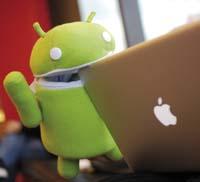New War on Operating Systems
Windows monopoly on personal computers

In its day, MS-DOS broke the hegemony of the computers of large producers and expensive operating systems, causing the popularization of personal computers. Computers in the 1980s were too expensive to be at home. Few producers dominated the market (IBM, DEC, Xerox...) and each had its own operating system (Vax, Unix...). And although they also tried to bring computers to homes, they didn't have real success for the price. Even less small producers: the need to develop the operating system also made it impossible to enter the market.
Then, IBM made a new attempt with personal home computers, a new machine and a new operating system. The machine was the PC ( Personal Computer) and commissioned the operating system to the new Microsoft company. This company did MS-DOS ( MicroSoft Disk Operating System), but it got from IBM a key deal to make our world as it is: Microsoft was authorized to license or also sell MS-DOS to other producers. The story is as follows: many small producers, using the reverse engineering that made computers compatible with the PC, equipped them with an MS-DOS operating system, through which personal computers entered their homes.
However, over time its successor, Windows, has become hegemonic, almost monopoly. And as it takes advantage of this situation to impose other products of its own (internet browser, office product…) has achieved an absolute control of the market with all the negative effects that this entails.
Windows only has two outstanding competitors. One is Apple's Macintosh computer with its MacOS operating system and another is the free Linux operating system for PC. But it is difficult to face Microsoft, since breaking monopolies is often very difficult. Apple's market share is very low compared to PCs. In addition, it can be said that if the Apple model prevailed, the situation would be even worse than with Microsoft, a system totally closed and controlled with very expensive hardware. With Linux, however, we have a good and economical alternative to PCs, which offers real freedom, but unfortunately its market share is even lower. And so is the situation in the world of personal computers in a useless war that seems to prolong ad eternum...
Leading Apple and iOS on New Devices
In recent years two new types of devices have appeared on the market that are expanding very quickly and that in the near future will be almost as widespread as personal computers: smartphones (mobile devices with Internet connection, WiFi, GPS, touch screen, etc.) and tablets (table-shaped computers). Although this type of device has not been invented by Apple, being a great generator of trends and successful in attractive designs, he has been the first to succeed through iPhone and iPad.
Both include an iOS operating system, a hypercontrolled and closed system, in which applications that can be installed and which are not decided by Apple, applications for it can be written in a single programming language... A market dominated by such systems is very harmful to all.
But the iPhone sold very well since its launch in 2007, to the almost monopoly of personal smartphones (RIM also has a wide market with its Blackberry, but especially for business uses). And the other competitors were very difficult to face, especially because of their lack of application to their operating systems. In fact, for the iPhone quickly emerged a rich ecosystem of lots of apps. However, if opponents initially don't have many applications, it's not easy to convince buyers; it's also not easy for developers to make applications for a low-market operating system. How to get out of that crazy wheel?
Alternative: Android free operating system
Google responded at the end of 2008: Based on Linux, he developed an operating system for smartphones and a number of basic, free applications that any mobile manufacturer could use. In a very short time many manufacturers integrated Android into their smartphones, becoming an attractive platform for developers, which soon had thousands of applications. The Android operating system is today an alternative with many good apps and great freedom.
Thus, in the last year the sale of Android has grown by 886%, and currently Android phones are sold more than iPhones, it is estimated that in one or two years there will be more Android than iPhones. The reaction with the iPad occurred earlier because Android was already developed: the iPad came out with great success in early 2010, but a few months later there were tablets with Android and there are more and more. All this allows to foresee in this new type of devices a better and freer panorama than in personal computers.
However, not everything is gold... If we buy a free smartphone with Android we can do what we want with it, but smartphones are expensive. On the contrary, in those subsidized by a telephony operator, the operator applies restrictions based on their interests: programs such as Skype or sharing the mobile internet connection with a PC or updating the operating system cannot be used... You can skip the restrictions by reinstalling the operating system, but they are not changes that can be made by anyone and you can also lose the phone warranty. Although it seems contradictory, telephony operators use Android's freedom to reduce their freedoms. As we have seen before, in this case, companies always use operating systems to control the device market...






